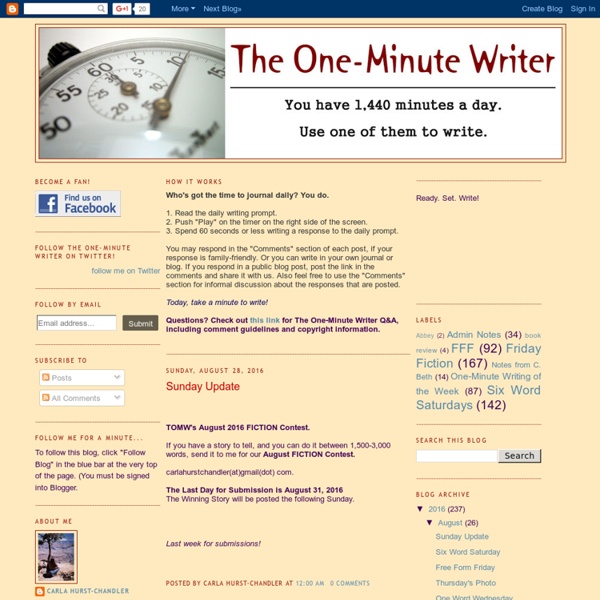



What to do after NaNoWriMo If you found a month madly dedicated to one project exhilarating amidst the exhaustion :-) there are more challenges throughout the year, some lasting a month, some a week, some 3 days, some 24 straight hours. :-) (The NaNoWriMo folks aren't affiliated with any of these except Script Frenzy.) From the I Wrote a Novel, Now What? page at the NaNoWriMo site which might have more challenges added throughout the year (plus a few free contests). DecemberNaNoFiMo.org - National Novel Finishing Month (December). Varies or throughout the yearNaBloPoMo - National Blog Posting Month (Year-Round). JanuaryJanNoWriMo - Goal: Write either 50k or your own word-count goal in January. FebruaryFAWM - February Album Writing Month (February). MarchNaNoEdMo - National Novel Editing Month (March). AprilScript Frenzy - NaNoWriMo's sister challenge (April). MayNational Picture Book Writing Week - (First week of May). JuneComiKaze - Create a 24 page comic in 24 hours. September3-Day Novel Contest - (September).
About a little thing called 750words on 750 Words Short Stories: 10 Tips for Creative Writers (Kennedy and Jerz) (Dennis G. Jerz, Seton Hill University) Script Frenzy Where Should a Second Chapter Start? on October 12th, 2010 by Fiction Editor Beth Hill and last modified on October 12, 2010 We’ve all read advice about the first chapter—how and where to begin a story; what makes for strong openings, depending on the genre; what not to include in the first paragraph or page of chapter one; what to include in a novel’s opening. We understand that a good opening chapter sets the tone and introduces lead characters and gets the plot rolling. We know almost as much about the final chapter, the final paragraph, and the final words. About how to finish a story so that it’s complete and satisfying and induces the reader to want more. Yet, where’s the advice for chapter two? What do we do to move from that compelling first chapter—the one that’s seen more rewrites than all other pages combined and multiplied by 10—and into the meat of the story? We certainly want to continue the tone we’ve established. Sure there are. Where should a second chapter start? 1. 2.
Dragon Writing Prompts The 7 worst ways to start your novel - Pro Writing Tips Aspiring novelists are always intimidated by the classics, especially when it comes to writing the opening of the novel. Look at what we have to live up to: “It was the best of times, it was the worst of times.” — A Tale of Two Cities, Charles Dickens“Mother died today. Who wouldn’t be shaking in their boots at the thought of having to measure up to such greatness? While I can’t tell you how to start your novel to get your name on that list, I can give you some tips on what not to do, so that your manuscript won’t end up in the trash can of agents and publishing houses around the country. 7. 6. 5. 4. 3. 2. 1. If you’re still struggling with your opening, check out the for inspiration. Related Posts
Flashbake: Free version-control for writers using git For the past couple weeks, I've been working with Thomas "cmdln" Gideon (host of the fabulously nerdy Command Line podcast) on a free software project for writers called "Flashbake" (which is to say, I described what I wanted and Thomas wrote the code). This is a set of Python scripts that check your hot files for changes every 15 minutes, and checks in any changed files to a local git repository. Git is a free "source control" program used by programmers to track changes to source-code, but it works equally well on any text file. If you write in a text-editor like I do, then Flashbake can keep track of your changes for you as you go. I was prompted to do this after discussions with several digital archivists who complained that, prior to the computerized era, writers produced a series complete drafts on the way to publications, complete with erasures, annotations, and so on. Enter Flashbake. It's all pretty nerdy, I admit. I love adapting programmers' tools for my writing.
How to Write a Good Story Beginning on August 11th, 2010 by Fiction Editor Beth Hill and last modified on April 11, 2012 Your first chapter, your opening scene, your very first words are an invitation to readers. Have you made your invitation inviting? That is, is it tempting or attractive or irresistible? That’s one aim of your story opening, to issue a hard-to-resist invitation to your fictional world. Books compete with movies and other books and games and the Internet and families and lovers—why wouldn’t you give your opening the strongest chance to snare a reader’s attention? What can be found in a compelling opening? MurderBetrayalConflictJealousyDeathGuiltThe unexpectedConfusionA new worldFearSurpriseUpheavalThe unusual What isn’t compelling? RoutineBlissPointless talkBack storyCliched characters Consider your first scene and first words your invitation to readers. Give them a reason to begin your story. Give them a reason to turn pages. Give them a reason to race to the end. Invite readers into your story. Leave a Reply